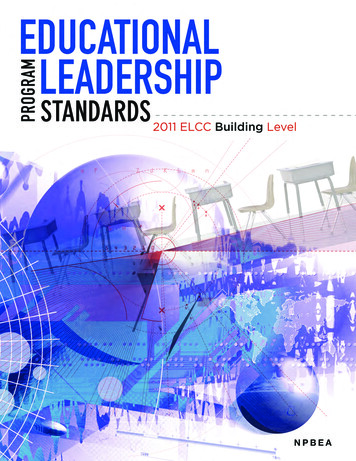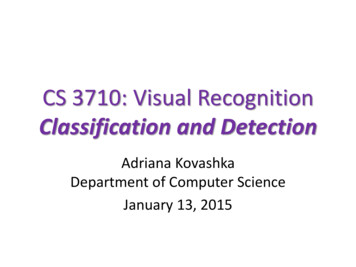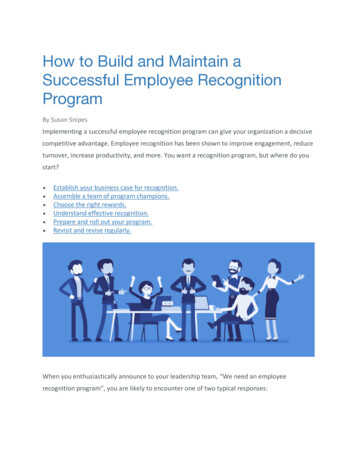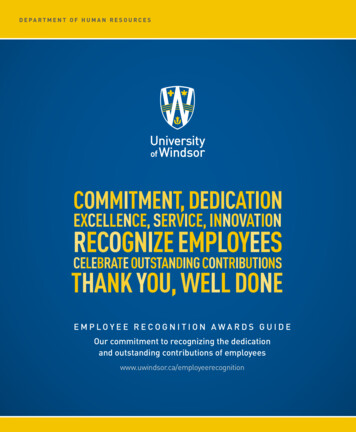
Transcription
uilding LevelFor institutions undergoing NCATE Accreditation andELCC Program ReviewPage 2
For Advanced Programs at the Master, Specialist,or Doctoral Level that Prepare Assistant Principals,Principals, Curriculum Directors, Supervisors,and other Education Leaders in aSchool Building EnvironmentNovember 2011National Policy Board For Educational Administration (NPBEA)Page 3
TABLE OF CONTENTSIntroduction3ELCC Program Standard 1.04ELCC Program Standard 2.07ELCC Program Standard 3.010ELCC Program Standard 4.012ELCC Program Standard 5.015ELCC Program Standard 6.017ELCC Program Standard 7.019Appendix 1Assessments Description21Reviewer Evaluation Rubric for Standards 1.0-6.021Reviewer Evaluation Rubric for Standard 7.022Policies for Making Program Report Decisions24Appendix 2Alignment of ELCC Program Standards withNCATE Standard PrinciplesAppendix 3Commentary and Research Support for StandardsReferencesAppendix 4GlossaryPage 427274872
INTRODUCTIONRationaleThe importance of clearly defining what successful learning or performance looks like hasbecome increasingly evident during the past decade. Without a doubt, the better one understandswhat excellence looks like, the greater one’s chances are for achieving – or surpassing - thatstandard. Ensuring effective school leadership begins with the following questions:o What do our P-12 students need to know, understand, and do?o What do our teachers and related staff need to know, understand, and do toincrease student learning?o What do our school building leaders need to know, understand, and do to supportteachers and building-level personnel to increase student learning?Effective use of leadership preparation standards requires multiple, high integrated and highlyinterdependent variables and assessments. The foundation of accountability is educators’understanding of the learning standards and a deep understanding of what mastery looks like.The potential value of analyzing and disaggregating student performance data is only as good asone’s understanding of the learning that data represents. Furthermore, while we yearn to assumealignment among standards, assessment, and instruction – in addition to policy, programs, andcourses - its tremendous importance and potential impact demand ongoing attention. Schoolleadership standards are no exception.HistoryWith the approval of the Educational Leadership Policy Standards: ISLLC 2008 (InterstateSchool Leaders Licensure Consortium), the NPBEA (National Policy Board for EducationalAdministration) approved an ELCC (Educational Leadership Constituent Council) plan to revisethe ELCC Standards for presentation to NCATE (National Council for the Accreditation ofTeacher Education) in the fall of 2010. Two groups, a Technical Advisory Committee and aSteering Committee, facilitated comprehensive research, revisions, and field review of theproposed changes prior to submitting them to NPBEA and NCATE.AssumptionsThe following assumptions are embedded within the ELCC school building-level leadershippreparation standards:1. Improving student achievement is the central responsibility of school leadership.2. The standards represent the fundamental knowledge, skills, and practices intrinsic tobuilding leadership that improve student learning.3. The overall leadership standards conceptually apply to a range of common schoolleadership positions. They are intended to define what a building-level administratorPage 5
should know and be able to do. While specific content and application details will varydepending upon the leadership role, the fundamental, enduring tenets are the same.4. While there is a purposeful emphasis on leading student learning, an understanding andacceptance of school leaders’ responsibility for managing the “business” of the school isalso embedded.5. The practice of school leadership is well-established as its own research-based body ofknowledge.6. The preparation of school leaders requires overt connections and bridging experiencesbetween research and practice.7. The preparation of school leaders requires comprehensive, field-based practice in andfeedback from the field over an extended period time in powerful clinical learningexperiences.8. School leadership preparation programs must provide ongoing experiences for candidatesto examine, refine and strengthen the ethical platform that guides their decisions –especially during difficult times.9. While school leadership programs are ultimately an institutional responsibility, thestrength of the design, delivery and effectiveness of these programs will parallel thedegree to which higher education invites P-12 participation and feedback.10. Performance-based measures are most effective in evaluating candidate outcomes.ImplementationImproving student achievement depends on the successful and simultaneous orchestration ofmultiple, yet individual, variables within the context of an overall school. Given theinterdependency between the execution of specific school leadership skills and the overalleducational environment, universities are expected to provide candidates with school leadershipexperiences that connect, embed and transcend explicit leadership skills within the context of ameaningful whole.Candidates need multiple bridging experiences between course content and the school. Whilelife in a university is compartmentalized for the convenience of instruction, life as a schoolleader requires the use of specialized skills within the context of often ambiguous, demanding,and interconnected events. Relentless connections to, and emphasis on, real or simulated schoolexperiences in regard to resources, methods and assessments will greatly facilitate graduate’sultimate success as a school leader.Leadership preparation programs must include three dimensions:1. Awareness – acquiring concepts, information, definitions and procedures2. Understanding – interpreting, integrating and using knowledge and skills3. Application – apply knowledge and skills to new or specific opportunities or problemsThe overall program should represent a synthesis of key content and high impact field-basedexperiences extended over time that result in the school leader candidates’ demonstration of theprofessional knowledge, skills, and dispositions articulated in the ELCC standards, and, mostimportantly, candidates’ success in improving student achievement following graduation.Page 6
ELCC BUILDING LEVEL STANDARDSELCC Standard 1.0: A building-level education leader applies knowledge that promotesthe success of every student by collaboratively facilitating the development, articulation,implementation, and stewardship of a shared school vision of learning through thecollection and use of data to identify school goals, assess organizational effectiveness, andimplement school plans to achieve school goals; promotion of continual and sustainableschool improvement; and evaluation of school progress and revision of school planssupported by school-based stakeholders.ELCC STANDARD ELEMENTS:ELCC 1.1: Candidates understand and can collaboratively develop, articulate, implement,and steward a shared vision of learning for a school.ELCC 1.2: Candidates understand and can collect and use data to identify school goals,assess organizational effectiveness, and implement plans to achieve school goals.ELCC 1.3: Candidates understand and can promote continual and sustainable schoolimprovement.ELCC 1.4: Candidates understand and can evaluate school progress and revise schoolplans supported by school stakeholders.RESEARCH SUPPORT FOR ELCC STANDARD 1.0:Research evidence in Appendix 2 presented in support of Standard 1 confirms that a buildinglevel education leader must have the knowledge to promote the success of every student throughunderstanding principles for developing, articulating, implementing, and stewarding a schoolvision of learning. This includes knowledge of the importance of shared school vision, mission,and goals for student success that is documented in the effective schools literature and schoolimprovement literature. It includes the knowledge that when vision, mission, and goals arewidely shared, student achievement usually increases.The importance of the knowledge presented in evidence supporting Standard 1 was recognized inthe reviews of scholarship informing the development of the Interstate School Leaders LicensureConsortium (ISLLC) 2008 Policy Standards that highlighted the importance of knowledgefacilitating the development, articulation, implementation, and stewardship of a vision oflearning that is shared and supported by all stakeholders. Formation of the ISLLC 2008Standards was also based on considering the importance of knowing the theoretical foundationsfor leadership practice. Some reviews of scholarship highlighted the importance of knowing howto collaboratively develop and implement a shared vision and mission. The importance ofknowing how to use evidence in decision making was highlighted in reports informing theformation of the ISLLC 2008 Standards. Other reports confirmed the importance of knowinghow to create and implement plans to achieve goals.Page 7
Acceptable Candidate Performance forELCC Building Level Leadership Standard 1.0ELCC Standard Element 1.1: Candidates understand and can collaboratively develop,articulate, implement, and steward a shared vision of learning for a school.Content KnowledgeProfessional Leadership Skills(Mostly likely to be met in Assessments #1, #2)(Most likely to be met in Assessments #3, #4, #5,#6)Programs provide evidence of candidateknowledge of collaborative school visioning; theories relevant to building,articulating, implementing, andstewarding a school vision; methods for involving schoolstakeholders in the visioning process.Programs provide evidence that candidatesdemonstrate skills required to design and support a collaborativeprocess for developing andimplementing a school vision; articulate a school vision of learningcharacterized by a respect for studentsand their families and communitypartnerships; develop a comprehensive plan forcommunicating the school vision toappropriate school constituencies; formulate plans to steward school visionstatements.ELCC Standard Element 1.2: Candidates understand and can collect and use data toidentify school goals, assess organizational effectiveness, and create and implementplans to achieve school goals.Content KnowledgeProfessional Leadership Skills(Mostly likely to be met in Assessments #1, #2)(Most likely to be met in Assessments #3, #4, #5,#6)Programs provide evidence of candidateknowledge of the design and use of assessment datafor learning; organizational effectiveness andlearning strategies; tactical and strategic program planning; implementation and evaluation ofschool improvement processes; variables that affect studentachievement.Page 8Programs provide evidence that candidatesdemonstrate skills required to develop and use evidence-centeredresearch strategies and strategic planningprocesses; create school-based strategic and tacticalgoals; collaboratively develop implementationplans to achieve those goals; develop a school improvement plan thataligns to district improvement plans.
ELCC Standard Element 1.3: Candidates understand and can promote continual andsustainable school improvement.Content KnowledgeProfessional Leadership Skills(Mostly likely to be met in Assessments #1, #2)(Most likely to be met in Assessments #3, #4, #5,#6)Programs provide evidence of candidateknowledge of continual and sustained improvementmodels and processes; school change processes for continualand sustainable improvement; role of professional learning incontinual and sustainable schoolimprovement.Programs provide evidence that candidatesdemonstrate skills required to identify strategies or practices to buildorganizational capacity that promotecontinuous and sustainable schoolimprovement; design a transformational change plan atthe school-building-level; design a comprehensive, building-levelprofessional development program.ELCC Standard Element 1.4: Candidates understand and can evaluate school progressand revise school plans supported by school stakeholders.Content KnowledgeProfessional Leadership Skills(Mostly likely to be met in Assessments #1, #2)Programs provide evidence of candidateknowledge of effective strategies for monitoring theimplementation, revision of plans toachieve school improvement goals, andprogram evaluation models.(Most likely to be met in Assessments #3, #4, #5,#6)Programs provide evidence that candidatesdemonstrate skills required to develop a school plan to monitorprogram development andimplementation of school goals; construct an evaluation process to assessthe effectiveness of school plans andprograms; interpret information and communicateprogress toward achievement of schoolvision and goals for educators in thecommunity and other stakeholders.ELCC Standard 2.0: A building-level education leader applies knowledge that promotesthe success of every student by sustaining a school culture and instructional programconducive to student learning through collaboration, trust, and a personalized learningenvironment with high expectations for students; creating and evaluating a comprehensive,rigorous and coherent curricular and instructional school program; developing andsupervising the instructional and leadership capacity of school staff; and promoting thePage 9
most effective and appropriate technologies to support teaching and learning within aschool environment.ELCC STANDARD ELEMENTS:ELCC 2.1: Candidates understand and can sustain a school culture and instructionalprogram conducive to student learning through collaboration, trust, and a personalizedlearning environment with high expectations for students.ELCC 2.2: Candidates understand and can create and evaluate a comprehensive, rigorous,and coherent curricular and instructional school program.ELCC 2.3: Candidates understand and can develop and supervise the instructional andleadership capacity of school staff.ELCC 2.4: Candidates understand and can promote the most effective and appropriatetechnologies to support teaching and learning in a school environment.RESEARCH SUPPORT FOR ELCC STANDARD 2.0:Evidence presented in Appendix 2 in support of Standard 2 confirms that a building-leveleducation leader must know principles for sustaining a school culture and instructional programconducive to student learning and staff professional growth. This includes knowing the elementsof school culture and ways it can be influenced to ensure student success; human developmenttheories; proven learning and motivational theories; how diversity influences the learningprocess; effective leadership practices, including those characterized as instructional leadership,transformational leadership, or leading learning; and models of change processes.The importance of the knowledge presented in evidence supporting Standard 2 was recognized inthe empirical evidence, craft knowledge and theoretical writings that supported the developmentof ISLLC 2008 Standard 2 promoting the success of every student by advocating, nurturing, andsustaining a school culture and instructional program conducive to student learning and staffprofessional growth.Classic theories of motivation, social control, and goals are foundational sources of knowledgefor education leaders seeking to nurture a culture of trust and to motivate faculty and students.Theories of human development and evidence found in case studies of how improvements inteaching and learning can be achieved confirm that both are essential to effective schoolleadership. A review of literature on learning-centered leadership concluded that instructionallyfocused leadership paired with leadership processes are required for high-performing schools.Earlier reviews found strong evidence that knowledge of leadership approaches to developingschool culture and climate is critically important. Evidence of the importance of appliedknowledge of how to create a culture of trust, learning and high expectations was found inscholarship on the effect that leaders have on building learning communities. Knowledge of thenature and practices of distributive leadership was identified as essential in a number of scholarlyworks consulted. Other reviews highlighted the importance of knowing curriculum planning andPage 10
how to develop motivating student learning environments. Infusing technology into leadershippractices has become a recognized domain of practical knowledge essential to effectiveinstructional leadership.Acceptable Candidate Performance forELCC Building Level Leadership Standard 2.0ELCC Standard Element 2.1: Candidates understand and can sustain a school cultureand instructional program conducive to student learning through collaboration, trust, anda personalized learning environment with high expectations for students.Content KnowledgeProfessional Leadership Skills(Mostly likely to be met in Assessments #1, #2)(Most likely to be met in Assessments #3, #4, #5,#6)Programs provide evidence of candidateknowledge of theories on human developmentbehavior, personalized learningenvironment, and motivation; school culture and ways it can beinfluenced to ensure student success.Programs provide evidence that candidatesdemonstrate skills required to collaborate with others to accomplishschool improvement goals; incorporate cultural competence indevelopment of programs, curriculum,and instructional practices; monitor school programs and activitiesto ensure personalized learningopportunities; recognize, celebrate, and incorporatediversity in programs, curriculum, andinstructional practices; facilitate the use of appropriate contentbased learning materials and learningstrategies; promote trust, equity, fairness, andrespect among students, parents, andschool staff.ELCC Standard Element 2.2: Candidates understand and can create and evaluate acomprehensive, rigorous, and coherent curricular and instructional school program.Content KnowledgeProfessional Leadership Skills(Mostly likely to be met in Assessments #1, #2)(Most likely to be met in Assessments #3, #4, #5,#6)Programs provide evidence of candidateknowledge of curriculum development andinstructional delivery theories;Page 11Programs provide evidence that candidatesdemonstrate skills required to collaborate with faculty to plan,
measures of teacher performance; multiple methods of evaluation,accountability systems, data collection,and analysis of evidence; school technology and informationsystems to support and monitor studentlearning.implement, and evaluate a coordinated,aligned, and articulated curriculum; use evidence-centered research inmaking curricular and instructionaldecisions; interpret information and communicateprogress toward achievement; design evaluation systems and makeschool plans based on multiple measuresof teacher performance and studentoutcomes, and provide feedback basedon evidence.ELCC Standard Element 2.3: Candidates understand and can develop and supervisethe instructional and leadership capacity of school staff.Content KnowledgeProfessional Leadership Skills(Mostly likely to be met in Assessments #1, #2)(Most likely to be met in Assessments #3, #4, #5,#6)Programs provide evidence of candidateknowledge of high-quality professional developmentfor school staff and leaders; instructional leadership practices; leadership theory, change processes,and evaluation; standards for high-quality teacher,principal, and district practice.Programs provide evidence that candidatesdemonstrate skills required to work collaboratively with school staff toimprove teaching and learning; design the use of differentiatedinstructional strategies, curriculummaterials, and technologies to maximizehigh-quality instruction; design professional growth plans toincrease the capacity of school staff andleaders that reflect national professionaldevelopment standards.ELCC Standard Element 2.4: Candidates understand and can promote the mosteffective and appropriate technologies to support teaching and learning in a school-levelenvironment.Content KnowledgeProfessional Leadership Skills(Mostly likely to be met in Assessments #1, #2)(Most likely to be met in Assessments #3, #4, #5,#6)Programs provide evidence of candidateknowledge of technology and its uses for instructionwithin the school; infrastructures for the ongoing support,Page 12Programs provide evidence that candidatesdemonstrate skills required to use technologies for improvedclassroom instruction, student
review, and planning of instructionaltechnology.achievement, and continuous schoolimprovement; monitor instructional practices withinthe school and provide assistance toteachers; use technology and performancemanagement systems to monitor,analyze, and evaluate school assessmentdata results for accountability reporting.ELCC Standard 3.0: A building-level education leader applies knowledge that promotesthe success of every student by ensuring the management of the school organization,operation, and resources through monitoring and evaluating the school management andoperational systems; efficiently using human, fiscal, and technological resources in a schoolenvironment; promoting and protecting the welfare and safety of school students and staff;developing school capacity for distributed leadership; and ensuring that teacher andorganizational time is focused to support high-quality instruction and student learning.ELCC STANDARD ELEMENTS:ELCC 3.1: Candidates understand and can monitor and evaluate school management andoperational systems.ELCC 3.2: Candidates understand and can efficiently use human, fiscal, and technologicalresources to manage school operations.ELCC 3.3: Candidates understand and can promote school-based policies and proceduresthat protect the welfare and safety of students and staff within the school.ELCC 3.4: Candidates understand and can develop school capacity for distributedleadership.ELCC 3.5: Candidates understand and can ensure teacher and organizational time focuseson supporting high-quality school instruction and student learning.RESEARCH SUPPORT FOR ELCC STANDARD 3.0:Evidence presented in Appendix 2 support of Standard 3 confirms that a building-level educationleader must have knowledge of best practices regarding management of a school organization,operations, and resources for a safe, efficient, and effective learning environment. This includesknowledge of effective management and effective leadership that are associated with improvedschool conditions and subsequent school outcomes. It also includes knowledge of humanresource issues such as educator work redesign; educator recruitment and selection; educatorinduction, mentoring, and professional development; educator appraisal, supervision, andPage 13
evaluation; and educator compensation. The importance of the knowledge presented in evidencesupporting Standard 3 was recognized in research informing the formation of the ISLLC 2008Standards which also found an understanding distributed leadership to be essential. Morerecently, researchers have found in their investigation of links to student achievement thatdistribution of leadership to include teachers, parents, and district staff is needed in order toimprove student achievement.Acceptable Candidate Performance forELCC Building Level Leadership Standard 3.0ELCC Standard Element 3.1: Candidates understand and can monitor and evaluateschool management and operational systems.Content KnowledgeProfessional Leadership Skills(Mostly likely to be met in Assessments #1, #2)(Most likely to be met in Assessments #3, #4, #5,#6)Programs provide evidence of candidateknowledge of school management of organizational,operational, and legal resources; school management of marketing andpublic relations functions.Programs provide evidence that candidatesdemonstrate skills required to analyze school processes and operationsto identify and prioritize strategic andtactical challenges for the school; develop school operational policies andprocedures; develop plans to implement and managelong-range plans for the school.ELCC Standard Element 3.2: Candidates understand and can efficiently use human,fiscal, and technological resources to manage school operations.Content KnowledgeProfessional Skills (Assessments 3, 4, 5, 6)(Mostly likely to be met in Assessments #1, #2)Programs provide evidence of candidateknowledge ofPrograms provide evidence that candidatesdemonstrate skills required to develop multi-year fiscal plans and methods and procedures for managingannual budgets aligned to the school’sschool resources, including thepriorities and goals;strategic management of human capital, analyze a school’s budget and financialschool operations, and school facilities;status; alignment of resources to building develop facility and space utilizationpriorities and forecasting resourceplans for a school;requirements for the school; project long-term resource needs of a technology and management systems.school; use technology to manage schooloperational systems.Page 14
ELCC Standard Element 3.3: Candidates understand and can promote school-basedpolicies and procedures that protect the welfare and safety of students and staff.Content KnowledgeProfessional Leadership Skills(Mostly likely to be met in Assessments #1, #2)(Most likely to be met in Assessments #3, #4, #5,#6)Programs provide evidence of candidateknowledge of school strategies supporting safe andsecure learning environments includingprevention, crisis management, andpublic relations; school strategies supporting studentdevelopment of self-management, civicliteracy, and positive leadership skills; school-based discipline managementpolicies and plans.Programs provide evidence that candidatesdemonstrate skills required to develop a comprehensive plan forproviding school staff, students, andvisitors with a safe and secure schoolbuilding environment; plan an aligned building disciplinemanagement policies and plan; evaluate and implement disciplinemanagement plans.ELCC Standard Element 3.4: Candidates understand and can develop school capacityfor distributed leadership.Content KnowledgeProfessional Leadership Skills(Mostly likely to be met in Assessments #1, #2)(Most likely to be met in Assessments #3, #4, #5,#6)Programs provide evidence of candidateknowledge of the meaning of distributed leadershipin a school environment and how tocreate and sustain it.Programs provide evidence that candidatesdemonstrate skills required to identify leadership capabilities of staff; model distributed leadership skills; involve school staff in decision makingprocesses.ELCC Standard Element 3.5: Candidates understand and can ensure that teacher andorganizational time focuses on supporting high-quality school instruction and studentlearning.Content KnowledgeProfessional Leadership Skills(Mostly likely to be met in Assessments #1, #2)(Most likely to be met in Assessments #3, #4, #5,#6)Programs provide evidence of candidateknowledge of supervision strategies that ensure thatteachers maximize time spent on highPage 15Programs provide evidence that candidatesdemonstrate skills required to develop school policies that protect time
quality instruction and studentlearning; management theories on effectiveschool time, priorities, and schedules.and schedules to maximize teacherinstructional time and student learning; develop a school master schedule.ELCC Standard 4.0: A building-level education leader applies knowledge that promotesthe success of every student by collaborating with faculty and community members,responding to diverse community interests and needs, and mobilizing community resourceson behalf of the school by collecting and analyzing information pertinent to improvementof the school’s educational environment; promoting an understanding, appreciation, anduse of the diverse cultural, social, and intellectual resources within the school community;building and sustaining positive school relationships with families and caregivers; andcultivating productive school relationships with community partners.ELCC STANDARD ELEMENTS:ELCC 4.1: Candidates understand and can collaborate with faculty and communitymembers by collecting and analyzing information pertinent to the improvement of theschool’s educational environment.ELCC 4.2: Candidates understand and can mobilize community resources by promotingan understanding, appreciation, and use of diverse cultural, social, and intellectualresources within the school community.ELCC 4.3: Candidates understand and can respond to community interests and needs bybuilding and sustaining positive school relationships with families and caregivers.ELCC 4.4: Candidates understand and can respond to community interests and needs bybuilding and sustaining productive school relationships with community partners.RESEARCH SUPPORT FOR ELCC STANDARD 4.0:Evidence presented in Appendix 2 in support of Standard 4 confirms that a building-leveleducation leader must know strategies for collaborating with faculty and community members;diverse community interests and needs; and best practices for mobilizing community resources.This includes knowing how to collect and analyze information pertinent to the schooleducational environment, and understanding the needs of students, parents, and caregivers inorder to develop collaboration strategies. The importance of the knowledge presented in theevidence supporting ISLLC 2008 Standard 4 was recognized in research showing that educationleaders require such knowledge when collaborating with faculty and community members andwhen responding to diverse community interests and needs and mobilizing community supportused to support ISLLC 2008 Standard 4. Reports on practices using mu
alignment among standards, assessment, and instruction - in addition to policy, programs, and courses - its tremendous importance and potential impact demand ongoing attention. School leadership standards are no exception. History With the approval of the Educational Leadership Policy Standards: ISLLC 2008 (Interstate











